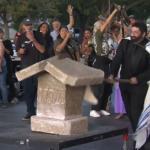
The Acts of the Apostles (the book that immediately follows the Gospels in the Christian New Testament) reports that after the death, resurrection, and ascension of Jesus, the early Christian church experienced a rapid growth in numbers. And because the early Christians owned and managed property collectively — “they would sell their possessions and goods and distribute the proceeds to all, as any had need” — administrative disputes inevitably arose.
In this case, Greek believers raised a claim that their widows and orphans were being neglected in the daily distribution of food when compared to the Jewish members of the community. Peter, John, and the other apostles suggested to the community that they choose seven “young men of good standing” to resolve such dispute, and they did. So, from an effort to correct the inequitable administration of resources across racial lines arose one of the first great innovations of church governance: deaconship.
Recently the conservative Christian columnist Matt Walsh published on the Daily Wire a letter entitled, “Dear Liberal Christians, It’s Not The Government’s Job To Give To The Poor. It’s Yours.” In this letter, Mr. Walsh scolds “Christians who advocate for higher taxes and higher welfare spending” on the grounds that Jesus called for “personal charity rather than government charity.” Mr. Walsh writes that “this is because there is no love in the Welfare System. There is no love in taxation. It is bureaucratic, impersonal, disinterested, dehumanizing.” Mr. Walsh minces no words in his critique, saying, “Stop blaming ‘the rich’ for [society’s failure to address poverty] and go out and do something about it, you hypocrites.”
Mr. Walsh’s point that political action is no excuse for personal inaction is well-taken, but does the Gospel’s call for personal action negate the need for governmental action?
The long Biblical tradition of Hebrew social justice answers with a resounding no. Leviticus, a book of Hebrew laws, imposed on Israelites a legal obligation to support any kin who fall into difficulty and dependency, and forbade lending money at an interest or selling food at a profit to those in need (Leviticus 25:35).
Proverbs describes how a good king, as a ruler, must “speak out for those who cannot speak, for the rights of the destitute. Speak out, judge righteously, defend the rights of the poor and needy (Proverbs 31:8).”
Hebrew prophets, like Isaac, Jeremiah, and Amos, repeatedly called on the kings and the nation of Israel to better safeguards the interests of its poor, its widows, its orphans, and its aliens. Jeremiah calls on the king of Judah to “act with justice and righteousness, and deliver from the hand of the oppressor anyone who has been robbed. And do no wrong or violence to the alien, the orphan, and the widow (Jeremiah 22:3).”
Isaiah, too, compares the rulers of Judah with the “rulers of Sodom” and exhorts them to turn away from empty, ritual worship and instead “seek justice, rescue the oppressed, defend the orphan, plead for the widow (Isaiah 1:17).” Ezekiel likewise declares that the sin of Sodom was that it had “excess of food, and prosperous ease, but did not aid its poor and needy (Ezekiel 16:49).” (All this suggests that the main fault for which Sodom has won its infamy as the archetype of a sinful society was not so much homosexual acts, as many assume, but rather its systemic indifference to the poor, both as a city and among its rulers.)
This prophetic tradition is continued by Jesus himself, who opens his ministry with a citation to Isaiah: “The Spirit of the Lord is upon me, because he has anointed me to bring good news to the poor. He has sent me to proclaim release to the captives and recovery of sight to the blind, to let the oppressed go free (Luke 4:18).” The point seems clear: we are called to serve the poor, not just as individuals, but also as communities and societies, as institutions and their stakeholders.
These prophetic words unto powers and institutions are all the more poignant today as we come to recognize that much of the problems and injustices that the poor face are far vaster and more complex than any individual, or church, can address. Daily, we learn more about the ways in which the lack of affordable housing or public transportation infrastructure contributes to starvation and malnutrition by confining poor people into food deserts, the ways in which poverty constrains women’s ability to leave violent and abusive relationships , the ways in which physical illness and mental illness often exacerbate each other in the context of poverty, and the ways in which climate change and environmental degradation first hurt and displace those who are the most vulnerable among us.
The scale and complexity of these injustices call for institutions of corresponding capacity and sophistication. Like the prophets, apostles, and deacons before us, we must set to the task of building consensus and designing processes for institutions that might confront these challenges and administer justice.
Mr. Walsh’s criticism of government services for the poor as impersonal and detached is intuitively appealing. It is therefore all the more dangerous. Working through complex and bureaucratic institutions may not be the most cathartic or emotionally satisfying way to serve the poor, but as the Gospel reminds us, love is not just a feeling, but a commitment. We must love God and others with all our heart, soul, and mind.
I may personally love participating in homeless ministries; I like sitting down with people experiencing homelessness, handing them blankets, serving them food, looking them in the eyes, and enjoying a conversation with them. It makes me feel warm, connected, human. But I also recognize that in a world in which vacant houses outnumber the homeless six-to-one, it might not be the only, or even the best, way in which I can express my love for those experiencing homelessness.
The administrative state, to be sure, is no substitute for the Kingdom of God. It is a flawed and at times inefficient instrument of good. According to 1 Samuel, God understood Israel’s request for an earthly king as a rejection of the heavenly one. Nevertheless, God’s prophets engaged with the kingdoms of Israel and Judah, and continually called on them to be instruments of God’s will: to administer justice for the poor, the widows, the orphans, and the aliens.
Love must surely ask of us to jump into the river to rescue the drowning, but at some point, it must also compel us to build bridges. And building bridges requires an engagement with institutions and laws that are sure to exhaust and frustrate us with their complexity and imperfections. As the poet W.H Auden says of law:
Like love we don’t know where or why,
Like love we can’t compel or fly,
Like love we often weep,
Like love we seldom keep.
Nevertheless, we must persist.
Eugene Nam is an M. Div. candidate at Harvard Divinity School and a J.D. candidate at Harvard Law School.
















